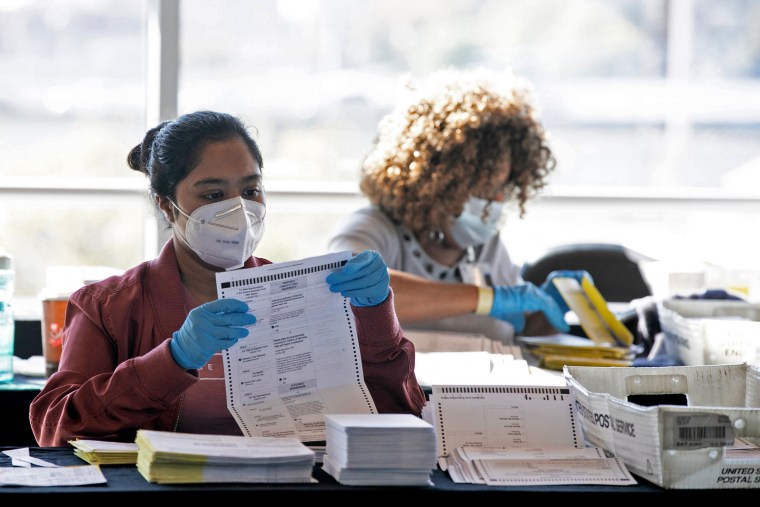With election results still being counted, Americans are feeling very stressed right now. The anxiety can feel unbearable, no matter your political leanings.
While there’s no denying the high-stakes political atmosphere, therapists say individuals can mitigate their personal suffering during this process by taking stock of their wellbeing and practicing self-care.
Know Your Value interviewed Northwestern University psychiatrist Dr. Aderonke Pederson, clinical social worker and therapist Sheila Robinson-Kiss and psychotherapist and editor-in-chief of Verywell Mind Amy Morin about what people can do to regulate their mental health as we wait for final results from Election Day.
1. Take extended media breaks.
All three experts suggested taking extended breaks from election news and social media in order to maintain a healthy mind.
“There's a cost for not backing away from this,” said Robinson-Kiss. “It comes in the form of a shorter temper, sleep deprivation, anxiety and depression. You have to ask yourself, how much am I willing to ultimately pay with my sanity?”

Morin noted that constant media scrolling is not only toxic for your health, it’s also unnecessary.
“We feel like we're missing out if we're not glued to it, but keeping yourself in a heightened state of anxiety all day doesn’t do anything to move things along,” Morin said. “You'll hear the news eventually.”
2. Identify your true sources of stress.
People can take some control of their stress by weeding out exactly what they’re stressed about, said Pederson. Otherwise, anxiety can feel all-consuming and totally out-of-control.
“Parse it out a little,” Pederson said. “So, for example, ‘I’m stressed out, but what am I stressed out about?’ Is it the future of the country as it comes to education? Health care? By identifying the sources of our stress, we avoid catastrophizing and global thinking. We want to avoid all-or-nothing thinking so we can cope with what is truly making us feel stressed.”
3. Map out what you can and can’t control.
Election results are out of individuals’ hands at this point. Letting go of that control is critical.
“You sitting there worrying, wringing your hands, it isn’t going to make them count those votes any faster,” Robinson-Kiss said.
People can control their own actions, coping strategies and accountability toward others. Focusing on those things may provide some stress relief, experts said.
“You can’t control the outcome of the election. But you can control what you do,” Morin said. “Do something kind for someone. Help a neighbor with a project. Go get some exercise.”
4. Do healthy, happy things.
At a baseline, experts suggested eating healthy, exercising, practicing mindfulness and sleeping well in order to regulate your mental faculties during stressful times.
“The situation is de-stabilizing, but your routine shouldn’t be de-stabilizing,” said Pedersen.

Additionally, people should take time to do things that make them happy, such as playing with their kids, being in nature, doing something creative or talking to a loved one about non-election matters.
“Get goofy, get silly,” Robinson-Kiss said. “Anything that puts you in the place with your body, your mind will follow. It’s hard to do running or sit-ups or dancing and still have the same focus on what is unfolding.”
5. Lean on your support system.
It is critical to lean on friends, family, therapists and loved ones right now. This is especially true for people who have a history of depression or mental illness.
“People really need to be proactive about seeking and asking for help from the community,” said Pedersen. “It’s hard for us to ask for help, and it’s been such a hard year.”

Morin noted that a support system can also be a wonderful distraction.
“Talk about something fun or something you have to look forward to,” Morin said. “Share funny things on social media. Anything to brighten your mood and change the subject.”
6. Acknowledge the importance of mental health.
Mental health is a vital part of overall well-being. While that may seem like an obvious statement, Pederson said we often take it for granted.
“When it comes to our mental health, as a society, we tend to deprioritize it,” Pedersen said.
People in a mental health crisis should care for themselves just as they would if they were physically ill, Pedersen continued. This may translate to seeking professional care or taking time off from work to restore.
“If we have the flu or any kind of physical illness, it seems easier to take a day off,” said Pedersen. “We need to exercise the same kind of caution we take when we're concerned about our physical body.”
7. Don’t make major life plans.
In extreme cases, some people are channeling their anxieties into planning major life changes, such as moving to New Zealand if the election doesn’t turn out the way they want. Facetious or not, it’s not a good idea to make major life decisions right now, Pedersen said.
“It's never a good idea to make big decisions in the middle of a crisis,” said Pedersen. “We’re usually not able to assess the situation fully...pace yourself, be patient with your decision-making. Put a date in your calendar and revisit the decision four weeks from now.”
